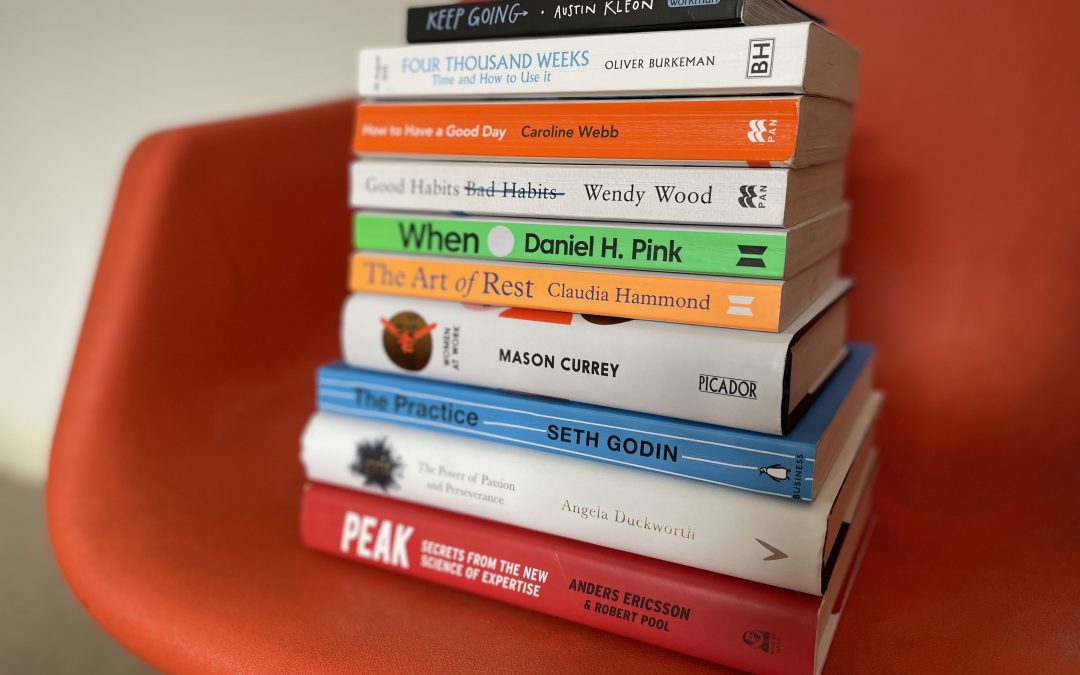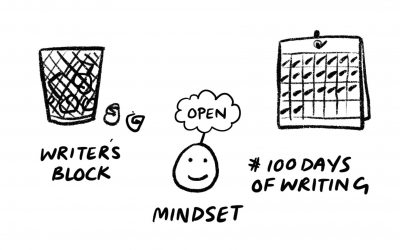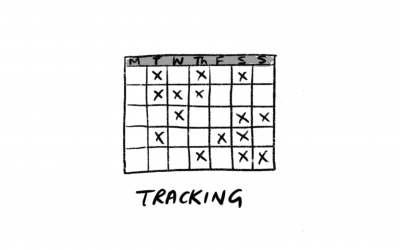From punchy pep talks to solid science, I’ve been reading books about how to build better habits and keep going for over a decade. These are the ones I turn to again and again when I want a burst of inspiration or help answering a tricky coaching question. Read on for my recommendations to help build productive habits, develop creative persistence and the resilience to keep going.
Keep Going: 10 Ways to Stay Creative in Good Times and Bad by Austin Kleon
Austin Kleon wrote this book because he needed it – and you’ll thank him for it. After ten years working as a professional writer who draws he “finally made peace with the fact that it might never get easier”.
Kleon shares simple rules for leading a productive, meaningful creative life delivered in punchy advice, quotes and his uniquely brilliant graphics. It’s the pick-me up when things get hard – treat yourself or gift a copy to a creative friend in need.
The Practice: Shipping Creative Work by Seth Godin
Another pep talk for action comes from multi-bestselling author and marketeer Seth Godin. Based on a workshop, The Practice is a powerful reminder that your work is worth doing.
In 219 short chapters, Godin encourages, persuades and provides practical advice so you can commit to your practice. As he writes in Chapter 24 – Start Where You Are: “Identity fuels action, and action creates habits, and habits are part of a practice, and a practice is the single best way to get where you seek to go.”
>> Read more: Build a rock solid writing routine with the psychology of habits
Good Habits, Bad Habits: The Science of Making Positive Changes That Stick by Wendy Wood
While there are many good books written about habits, Professor Wendy Wood led the research that underpins them all. Wood studies the psychology and neuroscience of habit and how we can change.
Good Habits, Bad Habits is brilliantly written and very accessible – it might not have the status of some of the more popular books, but it’s the one I recommend.
As Angela Duckworth wrote in the cover blurb, Wood is the “world’s most foremost expert in the field” so if you want advice on habits – go to the expert. Wood and Duckworth have collaborated on multiple studies into habit persistence, which leads us to…
Grit: The Power of Passion and Persistence by Angela Duckworth
Grit, according to Duckworth, is passion and perseverance for long-term goals. The book, published in 2016, combines cutting-edge research, interviews with high achievers, and Duckworth’s own story and frankly her obsession with what makes some people successful. While potential is one thing, what we do with talent is what matters.
Grit will help you work towards your big goals, “Even when you fall down. Even when you screw up. Even when progress toward that goal is halting or slow.” Forget talent or luck, instead Duckworth encourages us to cultivate grit – and guides us on the way to grittiness.
>> Read more: The complete guide to writing accountability – hold yourself to account and use others to help you achieve your writing goals
Peak: How All Of Us Can Achieve Extraordinary Things by Anders Ericsson and Robert Pool
Anders Ericsson is the mastermind behind deliberate practice. He wrote Peak to counter the popular science books that misinterpreted his research by overly focussing on the 10,000 hour or 10-year rule.
There is more to this type of practice than time. The hallmark of deliberate practice, according to Ericsson, “is that you try to do something you cannot do – that takes you out of your comfort zone – and that you practice it over and over again, focussing on exactly how you are doing it, where you are falling short, and how you can get better.”
>> Read more: How long does it take to become a good writer? Deliberate practice for writing
Peak is a great companion to Grit – they are similar conceptually as persistence is vital when mastering a skill. As Duckworth found, “Gritty people do more deliberate practice.” However, the thing that fills me with hope is their shared sense of optimism, a rejection of innate talent and a highly practical approach to improving your skills, whatever you decide to master.
Four Thousand Weeks: Time and How to Use It by Oliver Burkeman
While Ericsson urges us to stop focussing on time, Oliver Burkeman argues that is exactly what we need to do. He sets out to realign our relationship to time with the liberating idea of embracing finitude. Basically, in the long run, we are all going to die.
>> Read more: Oliver Burkeman’s 10 tips for a productive and happy writing life
However for Burkeman, confronting our own death is not a reason for despair. In fact, it is the key to leading a fulfilling and meaningfully productive life. Productivity does not mean doing more – quite the opposite. Writing a weekly productivity column for The Guardian, self-confessed productivity geek, Burkeman likened himself to an alcoholic employed as a wine expert.
He realised that getting more done just made him more stressed and unhappy. Instead he turned to ancient and contemporary philosophers, psychologists, spiritual teachers to better understand how to live a meaningful life and he shares the lessons and stories in this compelling book.
When: The Scientific Secrets of Perfect Timing by Daniel H. Pink
“I used to believe timing is everything. Now I believe that everything is timing.” Writes Daniel Pink, in one of the best closing sentences to a non-fiction book (Hat tip to Burkeman for my own embrace of finitude by opening this review with the end of the book).
>> Read more: How to make time to write – 4 approaches to finding time in busy schedules
Pink takes a scientific stance on time, to answer important questions, such as when is the best time of day to have a coffee and when should we quit a job, get married or run a marathon. Heavy on research it is light of touch – as we should expect from this million selling writer. Pink uncovers the hidden pattern of our lives, explains beginnings, middles and ends, and how to get in sync with other people. Utterly fascinating.
How To Have A Good Day: The Essential Toolkit for a Productive Day at Work and Beyond by Caroline Webb
Daniel H Pink said that How to Have Good Day is a ‘smart, thorough and eminently practical book’ and he’s right, in that Caroline’s Webb’s book has influenced my daily routine more than any other (and I read a lot!)
Webb’s role as a management consultant led her into the behavioural sciences as she advised organisations and people on how to flourish at work. She explains how to exert more control over our lives and enjoy what she calls, well-planned luck. There are tips you can apply immediately and use to shape your own good day – whatever that looks like for you.
Because, as author Anne Dillard famously wrote, “how we spend our days is, of course, how we spend our lives.”
The Art of Rest: How to Find Respite in the Modern Age by Claudia Hammond
While studies of mastery often focus on the amount and type of practice done, another finding emerged – that the best in their field slept more at night and took more naps. As Carl Jung said, “I’ve realised that somebody who’s tired and needs a rest, and goes on working all the same is a fool.” While more research needs to be done on ‘deliberate rest’ and its role in keeping going, Claudia Hammond’s book will inspire you to find your perfect downtime.
Based on the findings of a survey of 18,000 people from 135 countries called The Rest Test, Hammond explores the top 10 most popular restful activities. The Art of Rest closes with the perfect prescription for rest, including these tips on the right ingredients:
- Taking a break from other people
- Resting your mind as well as your body
- Exerting your body in order to rest your mind
- Being distracted from your worries
- Allowing your mind to wander
- Giving yourself permission not to achieve anything in particular
Daily Rituals Women at Work: How Great Women Make Time, Find Inspiration, and Get to Work by Mason Currey
If you are after inspiration and role models then Mason Currey is your guide. His popular blog Daily Rituals, became a best-selling book and this second volume looks more closely at the day-to-day lives of extraordinary creative minds. It redresses the gender balance (his first book featured 17% women) with wide appeal to all genders.
Historically, women have faced more obstacles to realizing their creative ambitions and as such this collection has wider application to those struggling to write and create. Currey told us:
>> Read more: Mason Currey’s top tips for wriggling through with daily rituals
“For readers trying to pursue their own creative projects, I think the biggest positive is just seeing that other people have gone through same difficulties you may be facing. If you’re having trouble finding the time for your creative work, or struggling with procrastination, writer’s block, or self-doubt, it can be tremendously comforting to read about how some of history’s greatest writers and artists dealt with the same obstacles on a daily basis.”
Enjoy! None of these books are specifically on writing – I’ll pull together a selection of my favourite writing guides, memoirs and interviews soon. In the meantime, I’d love to hear what books you return to when you need advice on keeping going, which of my selection catch your interest and what books I should add to my teetering ‘tbr’ pile.
[et_bloom_inline optin_id=optin_7]




